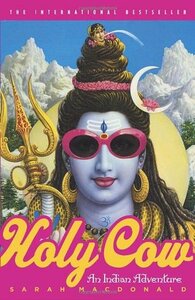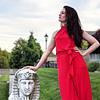Take a photo of a barcode or cover
At first I wasn't sure I'd like this, the cover and name making me wonder if the author was taking and portraying the people and cultures of India with perhaps less respect than they deserve and too flippantly. But you should never judge a book by it's cover, and I really enjoyed Macdonald's tale of her time in India, her perspective on the many religions that have a home there, the warm and welcoming people and the often times confounding cultural differences. It was a great read, and I'd recommend to anyone interested in life and adventure in India.
Perhaps this is silly, but because someone who I really love and admire lent me her copy, I wanted to really love this book. And then...didn't. It was good, at times very good, but also at times not very interesting, or even all that insightful. The problem was this: while the author obviously gained a tremendous amount from her year+ in India, she was not always as compelling a communicator of her experience as, say, the author of "[b:Eat Pray Love|19501|Eat, Pray, Love|Elizabeth Gilbert|http://photo.goodreads.com/books/1269870432s/19501.jpg|3352398]." Chalk it up to writing skills? I dunno. At any rate, this would be a good vacation read, and only furthered my feeling that I need to get my ass to the Indian subcontinent in my lifetime.
I'm on page 177 of 304 of Holy Cow: I find this book very enjoyable from the first page. I had read reviews about how it sheds a bad light on India and accusations that the author is a snobby Australian who does not appreciate the culture and beauty of India and its people. I think she is being very honest. I think many people would be afraid to write or say the things she says so blatantly about how she feels because it is unpopular.
She wrote "In India I've traveled a soul's journey: from hedonism to sickness, from silence to song, from violence to peace, and from learning to die to celebrating life." I think this line says everything that matters to refute the negative reviews of her writing as well as the criticism of her as a person. I am surprised to find that instead of her being narrow-minded as she has been called in countless reviews, the readers themselves actually closed their minds as soon as they encounter paragraphs of her depicting her experience with the filth and unreliability of India.
She wrote "In India I've traveled a soul's journey: from hedonism to sickness, from silence to song, from violence to peace, and from learning to die to celebrating life." I think this line says everything that matters to refute the negative reviews of her writing as well as the criticism of her as a person. I am surprised to find that instead of her being narrow-minded as she has been called in countless reviews, the readers themselves actually closed their minds as soon as they encounter paragraphs of her depicting her experience with the filth and unreliability of India.
informative
inspiring
reflective
fast-paced
This was fun....neat look at eastern religions from a western (australian, actually) perspective.
The first time Macdonald went to India, she loathed it and vowed never to return. But return she did, this time in pursuit of her partner, and she had to change her tune or be miserable.
Macdonald is astoundingly negative for the first twenty pages of the book -- enough so that I was left reeling for the next hundred pages, even though she was making an effort to make it work. I read this article right before reading Holy Cow, and one of the things the article says about Holtorf is that 'Holtorf advises people not to moan about countries they visit. They cannot change them, so if they don’t like them, they should stay away.' Seems like that might've been a good lesson here. (Of course, perhaps one could say the same about books...)
It's too bad, because once Macdonald gives India a chance, she learns some interesting things about it; she experiences a lot and ends up writing about the various religions she learned about. I'm glad I stuck with it; I laughed out loud at the bit about the hand twist. So...bitter first taste, got better with chewing? Or something like that.
Macdonald is astoundingly negative for the first twenty pages of the book -- enough so that I was left reeling for the next hundred pages, even though she was making an effort to make it work. I read this article right before reading Holy Cow, and one of the things the article says about Holtorf is that 'Holtorf advises people not to moan about countries they visit. They cannot change them, so if they don’t like them, they should stay away.' Seems like that might've been a good lesson here. (Of course, perhaps one could say the same about books...)
It's too bad, because once Macdonald gives India a chance, she learns some interesting things about it; she experiences a lot and ends up writing about the various religions she learned about. I'm glad I stuck with it; I laughed out loud at the bit about the hand twist. So...bitter first taste, got better with chewing? Or something like that.
This sounds like my type of book. It was very disappointing. I have it two starts since one star seemed a little harsh.
After initially starting this audio book I read some of the reviews, hopeing for a sign that it would get better. Big mistake, all I got were a bunch of comments from people who couldn't have read much more than 1/5 of the book. Why? Because it did get better. The first part of the book deals with Sarahs adjustment to living in a society totally different from her own, the frustrations and the heartache, and yes frankly she did come accross as a bit narrow minded and even bigoted. But as you got further through her story, you see how the athiest becomes to learn and take the best she sees from the religions she encounters, how she learns to deal with and then appreciate the local customs and people and finally how she sees the downside of living in Australia versus the society and country she now embrases as her second home. You would not think that the women who wrote the first section of this book is the same who wrote the ending.
I wasn't sure if I was going to like this book or not -- I had mixed feelings much of the way through it, in part because of the stark reality of India and in part because of the never-ending quest for religious learning. In the end, though, I have to say that I appreciated India and the book more than I expected. A friend of mine who is first generation Indian-American was surprised when I said I wanted to visit India -- "Why? It's a crowded mess of poverty and crime and dirt." And I have worried about that fact -- I hate bugs and dirt and crowds and what I know of the "sanitary facilities" is incredibly unappealing. This book did not gloss over any of that, but managed to find the color and life and vibrant passions that make India seem like such a land of enchantment. It was an honest look and a good balance. I think that if I should ever venture to India, I would need an experienced guide like the author in order not to freak out like her friend Emma did when faced with crowds of lepers and cockroaches and bawdy bodily-functions publicly indulged.
The quest for religious learning took some getting used to, but in the end it really worked for me, because it helped to explain the giant gumbo that is India -- a land of many gods and many religions, all fighting for power and trying to co-exist at the same time. Given that the author started out an atheist (whereas I have already largely made peace with my faith), it was appropriate that she try a bit of everything. And by sampling all of the religious facets of India she was able to see and understand all of the elements of the nation's character -- how gut-wrenching poverty sits side-by-side with the gaudy extravagance of Bollywood, how people seek purification by bathing in the most polluted river on earth, how female goddesses are revered in a place where female children are left to die for the crime of being born and women are incinerated on the funeral pyres of old dead husbands who never treated them well enough to be truly mourned for themselves.
All in all, an enlightening read in many ways and one that will make me think long and hard before I visit India.
The quest for religious learning took some getting used to, but in the end it really worked for me, because it helped to explain the giant gumbo that is India -- a land of many gods and many religions, all fighting for power and trying to co-exist at the same time. Given that the author started out an atheist (whereas I have already largely made peace with my faith), it was appropriate that she try a bit of everything. And by sampling all of the religious facets of India she was able to see and understand all of the elements of the nation's character -- how gut-wrenching poverty sits side-by-side with the gaudy extravagance of Bollywood, how people seek purification by bathing in the most polluted river on earth, how female goddesses are revered in a place where female children are left to die for the crime of being born and women are incinerated on the funeral pyres of old dead husbands who never treated them well enough to be truly mourned for themselves.
All in all, an enlightening read in many ways and one that will make me think long and hard before I visit India.
I have to admit that I decided to read this book because it has a great cover. I should have peeked a bit inside, though, because the cliched chapter titles would have kept me away: Insane in the Membrane, Birds of a Feather Become Extinct Together, etc.
Basically, this is the memoir of a selfish Australian woman's year in India. She sees India as a filthy place full of disgusting people with intolerable cultural habits. And she spends her free time (while her husband is working in other cities or countries on news stories) traveling around India in search of religion. She seems to have a disdain for religion at the same time she seeks out religious celebrities and empty religious experiences.
Perhaps I have negative feelings about the author's view of India because, when I was in India, all I felt was compassion and sadness for the poor around me. What type of person sees poverty and is disgusted by it? I guess it's this type of selfishness that also keeps her from giving a face and a personality to her husband in her writings.
Edit: I much more prefer the attitude of the writer in this article concerning India: http://www.bbc.com/travel/story/20150901-indias-chaotic-lesson-in-letting-go
Basically, this is the memoir of a selfish Australian woman's year in India. She sees India as a filthy place full of disgusting people with intolerable cultural habits. And she spends her free time (while her husband is working in other cities or countries on news stories) traveling around India in search of religion. She seems to have a disdain for religion at the same time she seeks out religious celebrities and empty religious experiences.
Perhaps I have negative feelings about the author's view of India because, when I was in India, all I felt was compassion and sadness for the poor around me. What type of person sees poverty and is disgusted by it? I guess it's this type of selfishness that also keeps her from giving a face and a personality to her husband in her writings.
Edit: I much more prefer the attitude of the writer in this article concerning India: http://www.bbc.com/travel/story/20150901-indias-chaotic-lesson-in-letting-go






